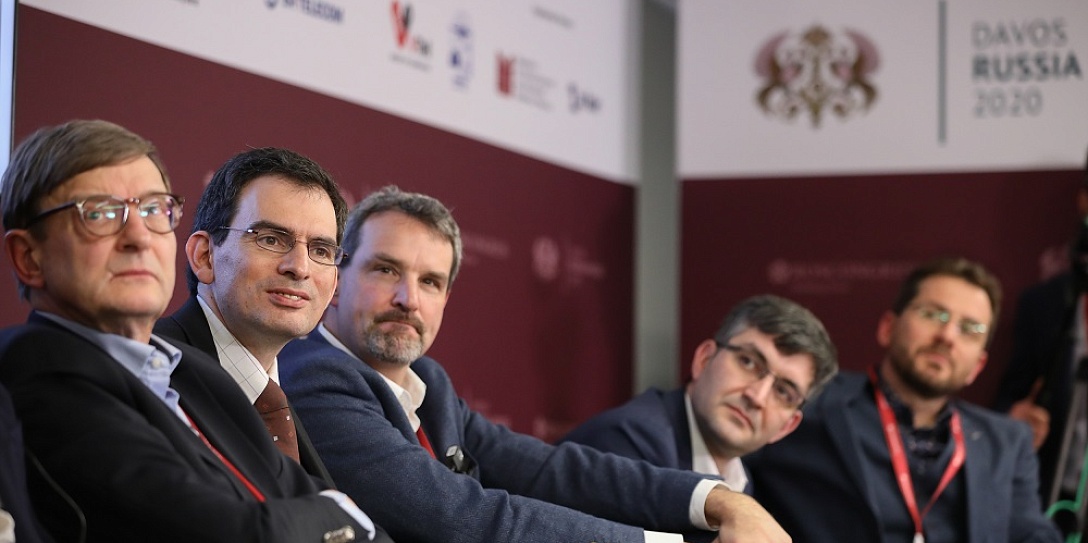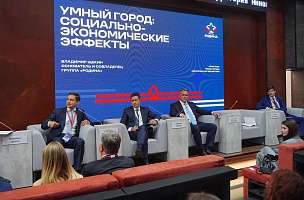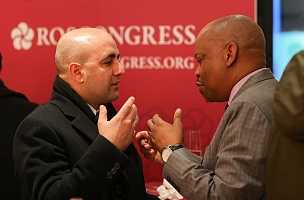KEY
CONCLUSIONS
It is important to keep up with the quantum technology
race
«The second quantum revolution is essentially over. Now, there is a race between major players in quantum technologies. Russia is not a leader in this race, but neither is it a complete outsider. Russia has launched a programme to create their own quantum computer. RUB 23 billion has already been spent on this goal,» Alexey Kavokin, Head, International Center for Polaritonics at Westlake University; Professor, University of Southampton.
The promise of quantum technology extends far beyond
the field of cryptography
«The quantum revolution is the most optimistic of all previous technological revolutions. Quantum computers will expand the possibilities available to humankind — this is the main difference of the quantum revolution. Quantum technologies will add to humans’ abilities. It will all start, probably, with financial services. New materials will be created. The ability to predict the behaviour of separate molecules will help cure cancer,» Ruben Enikolopov, Rector, New Economic School.
«We developed a special chip that already has a commercial application. Fully programmable, ultra-fast optical/optical switches for fibre optics nets, sensors for precision spectroscopy and spectrometry using synthetic spectra. In our devices, we can put a library of thousands of synthetic spectra, because the accommodation time is picoseconds, so we can follow a chemical reaction. We are faster than a chemical reaction. We also want to develop an optical, ultra-fast, quantum processor capable of working at room temperature,» Gianfranco Basti, Full Professor of Philosophy of Nature and of Science, Lateran University in Rome.
Quantum
technologies will help take medicine to a whole new level
«We are developing the biggest project on pathological pain. One way of taking care of pathological pain is using transcranial stimulation. Stimulation that could be piloted by a quantum computer, because of the complexity of the task,» Gianfranco Basti, Full Professor of Philosophy of Nature and of Science, Lateran University in Rome.
«In the future, quantum theory could aid in the development of medicine through big data analysis. We must explore the enormous amount of information we have from every individual patient. This is what large-scale data management is, first and foremost, all about: trying to understand the individualised or personalised medicine of the future. Large scale data management and potential quantum technologies will help us better explore the medical technologies already being employed: imaging, pathology, lab tests,» Otmar Wiestler, President, Helmholtz Association.
«In order to master future data-based medicine or digital health, we must rely on three major pillars: first, we must have standardized, curated data; second, we must employ all of the powerful, new, AI-based algorithms and technologies for the analysis of complex medical data; third, we must rely on powerful computer technologies. This is where quantum computing comes in. If we could employ quantum sensing technology in a number of medical devices, we would certainly achieve a new level of quality in many of these devices. We are currently creating a model of the human brain using supercomputers, but once quantum qubit systems are available, ambitious projects like the human brain project will, of course, enter into a new era,» Otmar Wiestler, President, Helmholtz Association.
Quantum
tech will force humankind to face new philosophical and ethical questions
«We should note the importance of the humanities. The more that technology advances, so too does the potential of these technologies to create and destroy. The quantum revolution posits yet another of these challenges. When we speak about the humanities, yes, we speak about ethics, we speak about true secular ethics that are based on physics and a humanistic philosophy. These values must lie at the centre of everything,» David Verdesi, Anthopologist; author of the Superhuman methodology based on the research of world religions and the latest discoveries in quantum physics and neurobiology.
PROBLEMS
Quantum
computers are an enormous threat to data security
«Pessimists say that the quantum computer is the nuclear bomb of the 21st century. It’ll easily decrypt ciphers, bank accounts, online accounts. None of this will be safe upon the arrival of the quantum computer,» Alexey Kavokin, Head, International Center for Polaritonics at Westlake University; Professor, University of Southampton.
«Quantum computers can quickly decrypt public key cryptography,» Alexander Lvovsky, Professor, University of Oxford.
Lack of financing for quantum tech
research
«Science depends on financial support. We do what our sponsors want to see,» Alexey Kavokin, Head, International Center for Polaritonics at Westlake University; Professor, University of Southampton.
SOLUTIONS
Implementing
government programmes for the development of quantum technologies
«Governments need to allocate more money to quantum security. I hope that the governments of most major countries, including Russia, will seriously work towards this goal,» Alexey Kavokin, Head, International Center for Polaritonics at Westlake University; Professor, University of Southampton.
Searching
for original models when creating supercomputers
«The engineering limitations of synchronizing the work of qubits in quantum computers puts them on the same level as traditional supercomputers. If we put error correction into quantum computers, we are actually very far behind a universal supercomputer. We need to try to interface the supercomputers of today with quantum technology. We might make quantum coprocessors that can actually assist our supercomputers,» Pavlos Lagoudakis, Professor, Skolkovo Institute of Science and Technology.
Implementing
quantum encryption and data protection technologies
«Cryptography is a race between the code-makers and the code-breakers. We need to think about a new type of cryptography, a new code, that would be able to withstand quantum computing. You need to start the move to this new kind of cryptography early enough, so when sensitive data is exchanged, it can be protected for its lifetime,» Gregoire Ribordy, Chief Executive Officer, Vice Chairman of the Board, ID Quantique.
«Unlike quantum computation, quantum cryptography is not science fiction: it’s today’s technology. Quantum technology offers us not only a sword, but also a shield. If someone tries to eavesdrop on a quantum-encrypted system, that action will be detected,» Alexander Lvovsky, Professor, University of Oxford.
«Quantum encryption using our technology would be able to operate at room temperature. So, we could develop quantum encryption for everybody. This is important for a person’s dignity, because the protection of data is fundamental,» Gianfranco Basti, Full Professor of Philosophy of Nature and of Science, Lateran University in Rome.
«In medicine, we will strongly rely on data protection, anonymization of data, and special curation of complex data. So how do we achieve this? What we really need to do is establish new links and bridges between the world of quantum technologies and the world of medicine,» Otmar Wiestler, President, Helmholtz Association.
Developing new philosophical and cultural foundations
for society
«The educational opportunity is to develop a culture based on quantum field theory. This would be similar to the Eastern and Western traditions of metaphysics: integrating science, philosophy, and religion. We must integrate quantum science and technology into the humanities,» Gianfranco Basti, Full Professor of Philosophy of Nature and of Science, Lateran University in Rome.
For more information, visit the
Roscongress Foundation’s Information and Analytical System at roscongress.org/en.






